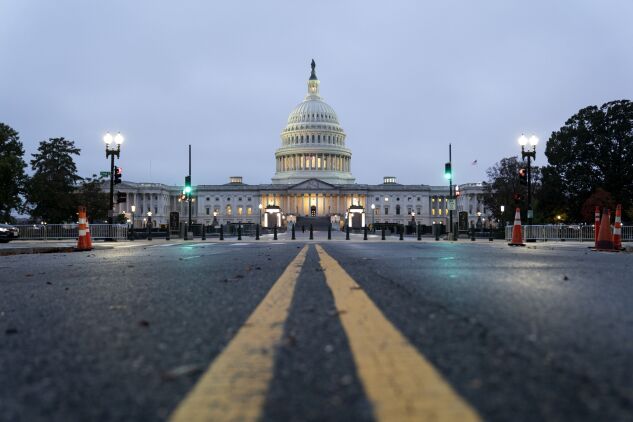Monday morning musings for workplace watchers
Unions Court the GOP | Virginia Dems Have a Labor Agenda
Ian Kullgren: Just a few weeks ago, the idea that the Republican-controlled House would restore collective bargaining rights for hundreds of thousands of federal workers—and reverse an order from President Donald Trump—seemed out of the question.
Now that the House is poised to pass that bill, unions are hoping to pull off the impossible by getting Senate Republicans, and Trump himself, to flip on the legislation.
“The president is able to change his mind on measures he’s undertaken, on his position on things,” Jody Calemine, legislative director for the AFL-CIO, told me. “We’re seeing it right now with the Epstein discharge petition.”
Last week a bipartisan group of lawmakers quietly gathered enough signatures for a discharge petition on the bill championed by
The path forward is murky, however. The measure needs 60 votes in the Senate, requiring more than a dozen Republicans to join all Democrats to pass it. Trump would have to sign it, an outcome that seems like a long shot but one union believes is squarely in the realm of possibility.
It’s worth noting that Trump doesn’t have to wait for a bill to hit his desk. Like releasing the files about disgraced financier Jeffrey Epstein, repealing the collective bargaining order is an administrative action he could take on his own.
The fight takes place against a larger backdrop of Republicans, including Vice President JD Vance and Sen.
Sen.
The bill to restore federal workers’ bargaining rights may prove pivotal for the relationship between organized labor and Republicans. Until now, conservatives in Congress haven’t supported unions’ legislative priorities, something the latter group is quick to point out during campaign season.
Republicans have tried draw labor into the MAGA coalition, with mixed success. Union voters were one of the few groups that didn’t shift to the right in the 2024 election, though Trump has made gains in states such as Ohio, where he won the majority of union households.
“They do all kinds of jobs for their communities, and their voices carry a lot of weight, so at the end of the day, the majority of the House is going to be on their side,” Calemine said.
Rep. Don Bacon (R-Neb.), told The Hill that GOP lawmakers need to “force the issue” on Trump to maintain his standing among unions and their members.
“It’s for the president’s own good,” he said.
Chris Marr: Virginia’s workplace laws are set for a shakeup in 2026, as Democrats retake the governor’s office and retain majority control of the legislature.
Legislators are looking to phase in a $15 minimum wage by 2028 (HB 1 and SB 1) and launch a paid family and medical leave program (SB 2) funded by payroll taxes, among other proposals that lawmakers have prefiled for the lawmaking session that begins Jan. 14.
Democrats’ wins in state House elections earlier this month, along with former US Rep. Abigail Spanberger’s (D) election as governor, position the party to advance a wide range of progressive policies including in the labor and employment realm. The election ends four years of divided government in the commonwealth, with Gov. Glenn Youngkin (R) helming the executive branch.
The bills filed so far would mandate that employers provide paid sick time (HB 5) and repeal the state’s “right to work” law (SB 32), which prevents workplace labor contracts from making union membership mandatory for all employees.
Other workplace-related measures that Youngkin vetoed over the past two years also could resurface, including bills to regulate how employers use artificial intelligence tools in hiring decisions, ban businesses from demanding that job applicants disclose their salary history, and mandate that job ads include a salary range.
Even with trifecta control, Democrats are unlikely to agree on every proposal. Spanberger told reporters she opposes repealing the “right to work” law, and her campaign touted her as being ranked “the most bipartisan member of Congress.” A representative for her transition team didn’t respond to a request for comment.
Lawmakers’ attempt to repeal “right to work” met a similar fate last time Democrats took control of the state government in 2020, as then-Gov. Ralph Northam (D) also opposed a repeal.
Still, if Democrats imitate their 2020 session, they could move fast in January to pass a laundry list of proposals. In 2020, they enacted a minimum wage increase, expansion of labor rights for public-sector employees, and bans on LGBTQ+ discrimination and racial bias involving hairstyles and textures.
“Our economic agenda—from raising the minimum wage to expanding paid sick leave to strengthening housing affordability—focuses squarely on improving everyday life for working families,” said Del. Kathy Tran (D), chair of the Virginia House Democratic Caucus, in a written statement announcing the party’s initial bill filings.
House GOP Leader Terry Kilgore criticized the raft of bills as likely to “drive up costs, increase regulations, and chase jobs out of Virginia into neighboring states.”
We’re punching out. Daily Labor Report subscribers please check in for updates during the week, and feel free to reach out to us.
To contact the reporters on this story:
To contact the editor responsible for this story:
Learn more about Bloomberg Law or Log In to keep reading:
See Breaking News in Context
Bloomberg Law provides trusted coverage of current events enhanced with legal analysis.
Already a subscriber?
Log in to keep reading or access research tools and resources.


